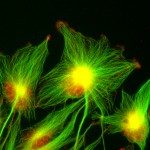Lien vers Pubmed [PMID] – 25268803
J. Mol. Biol. 2015 Feb;427(4):775-91
Mucopolysaccharidoses type III (MPSIII, Sanfilippo syndrome) are genetic diseases due to deficient heparan sulfate (HS) saccharide digestion by lysosomal exoglycanases. Progressive accumulation of undigested saccharides causes early-onset behavioural and cognitive symptoms. The precise role of these saccharides in the pathophysiological cascade is still unclear. We showed that exposure of wild-type neural cells to exogenous soluble HS fragments of at least eight saccharides activated integrin-based focal adhesions (FAs), which attach cells to the extracellular matrix. FAs were constitutively activated in MPSIII type B astrocytes or neural stem cells unless undigested saccharides were cleared by exogenous supply of the missing exoglycanase. Defective cell polarisation and oriented migration in response to focal extracellular stimuli in affected cells suggest improper sensing of the environment. We consistently observed abnormal organisation of the rostral migratory stream in the brain of adult mice with MPSIII type B. These results suggest that cell polarisation and oriented migration defects participate to the neurological disorders associated with Sanfilippo syndrome.


